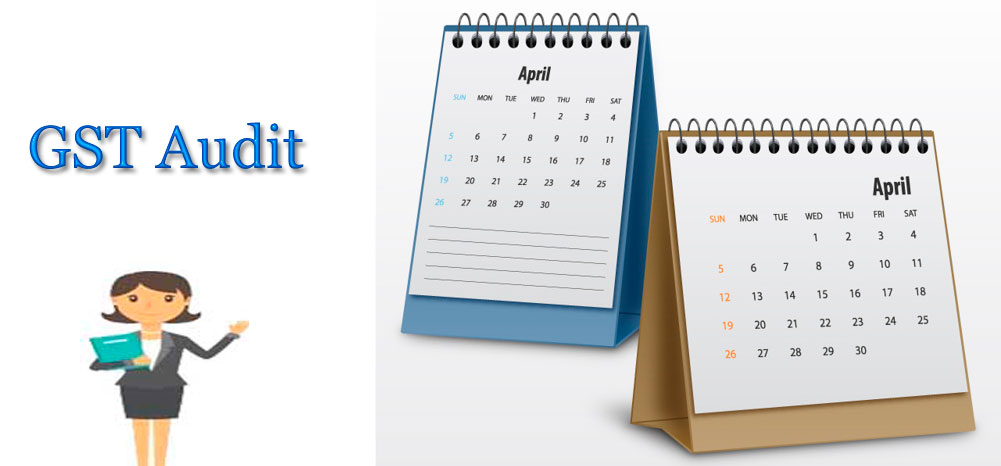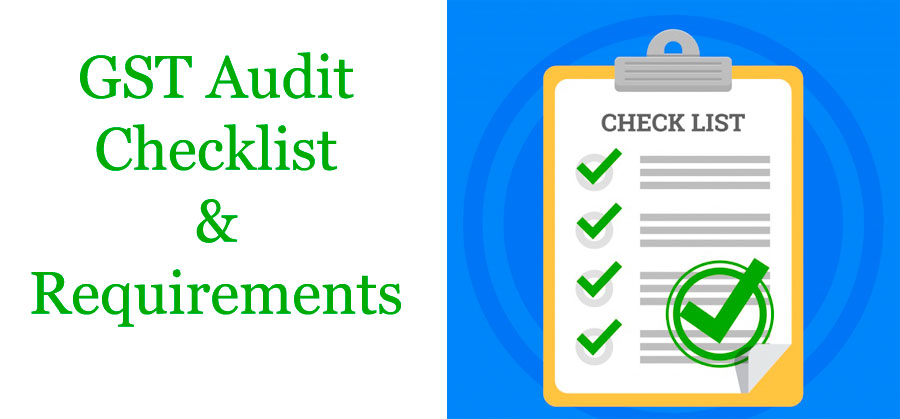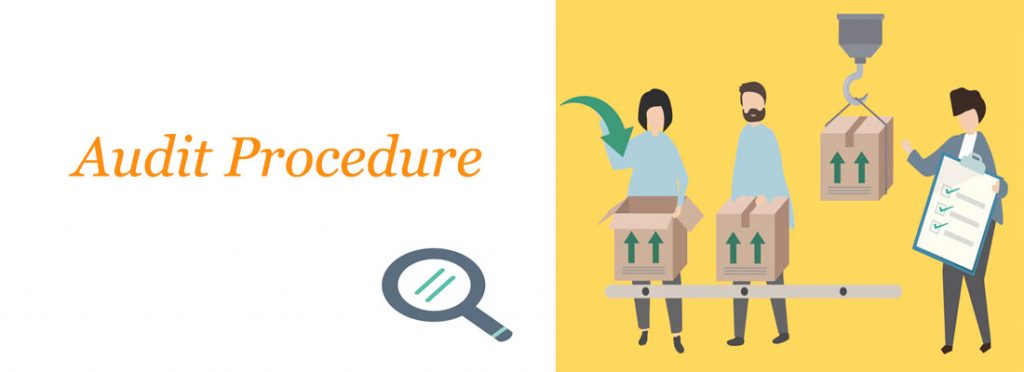Introduction to GST Audit Due date: There is no specific GST audit due date under Goods and service tax law. However, if you are looking for GST audit report filing due date in the form of GSTR 9 (Reconciliation format) then the last date is 30.06.2019 for FY 2017-18. You may check latest GSTR 9 Due date extension notification for any further extension.

Further, if you are looking for GST audit and document verification by the GST officials then you need to read this entire article. Let us see how GST department is conducting the GST audit and how one can get ready for such audits.
According to the GST law, the assessee is required to self-assess his GST returns filed during any financial year. Thus, he must determine the tax liability without any intervention by the tax official. Other then this, the tax authorities may undertake to make GST audit at any point of time or period as per the existing law.
According to CGST Section 65(3), The GST registered person will get a notice in advance not less than fifteen working days prior to the conduct of GST audit. The notice will be in FORM GST ADT-01.
The meaning of GST Audit is, the examination of records, returns and other documents maintained by the GST Registered person under the GST ACT. It is to verify the correctness of turnover declared, taxes paid, refund claimed and the input tax credit availed.
According to GST law, Audit has a definition in section 2(13) of the CGST Act, 2017. GST Audit is conducted to assess the compliance of the Taxpayer with the provision of the GST Act and rules.
GST Audit Limit
The GST audit limit is 2 crore rupees. Therefore, every registered person whose turnover exceeds 2 crore during a financial year shall make the audit of his books of accounts through Chartered Accountant or Cost accountant. Also, he needs to furnish GSTR 9C Reconciliation statement on www.gst.gov.in website.

The above GST audit limit is specified in GST audit Rules chapter VIII under serial 80(2). As of now, this limit will be applicable for fy 2017-18 and 2018-19 also. However, the government may issue a notification extending this turnover limit. You may also, refer GST audit section 65 and section 66 of CGST ACT 2017.
How long GST Audit Lasts?
According to the CGST Section 65(4) The audit shall be completed within a period of three months from the date of commencement of the audit. However, the commissioner may extend the period by another 6 months, if they cannot complete it within an initial period 3 months. Therefore, taxpayer must be ready for audit before GST audit due date arrives.
In order, to extend this period the audit official has to write to the Commissioner giving specific reasons. Thereafter, it solely depend upon the commissioner to extend the period.
GST Audit Checklist
There is no complete GST audit checklist and requirements as such in GST law. The main purpose of the GST audit is to check whether the taxpayer has paid the taxes properly or not. Taxpayer must keep all documents ready before receives the letter of GST audit due date of his business. Thus, to verify the correctness GST officials may ask any documents relating to your business and its activities. We have listed below the major GST audit checklist points for your reference.

1. GST Registration
Verification of GST Registration of Taxpayer and its additional branches if any. You should paste GST Number Details in front of your business premises. Also, you should have GST Registration Certificate pasted inside the premises.
Further, if you have done any amendments like change in the board of directors, change in manufacturing process like change in HSN code, then you must get it updated on your GST registration. Kindly keep your GST registration Up-to-date.
2. GST Invoice
GST officials will check whether you have Issued GST Invoices as per CGST Rules. They may not check all invoices, but random checking will be done. Ensure that your all invoices contain tax amount for which you are liable to pay GST.
If you are generating invoices through software, there may be chances that the system did not calculate GST amount and you dispatched the material. While filing GSTR 3B return, ensure that you always calculate GST amount with tasses sable value manually. This will help you out to verify whether your software has calculated GST amount correctly for all items and for all invoices.
3. Verification of Financial Statement
Since, your auditor will file GSTR 9C i.e Financial statement on GST portal, the officer will verify and note down any discrepancies before visiting your site or calling for records for audit.
Therefore, you must see that the figures like Taxable sales, local purchases, imports if any, are shown exactly as shown in GST returns filed by you.
In case, of any mismatch, see that when you have made corrections to it or you have clarification ready for such mismatch.
4. GST Returns
See Whether you have filed your GST Returns on Time. If late filed, late fees are paid or unpaid. Whether the tax amount paid on time or not. if paid later, interest is paid or not.
If you note anytime that you have short-paid any tax at any point of time then kindly include such amount while filing your next return. Ensure that you pay such tax amount with interest per day.
5. Input Tax Credit Verification
The GST official will Verify Input Tax Credit including transitional ITC. You must ensure that you have availed ITC with correct documents and from the authenticate supplier. Always, keep ready all ITC taken invoice copies ready with the proper filing system. Reconcile entries in GSTR 2A with your ITC availed purchase register.
6. Job Work Activities
Keep your Job work ledger up-to-date. Maintain proper file keeping track of material issued for job work against each challan. kindly ensure that you have properly closed job work challans against material received.
Also, see that you close your job work challans before its time period mentioned in GST rules. Either you should return it your supplier or get them back from job worker before the expiry of such period.
We recommend to prepare your own GST audit checklist, because you know your business better then others.
Types of GST Audits
There are three types of GST audits as per GST Law in India. Audit by Chartered Accountant, Normal Audit and Special Audit. Let us see them one by one.
1. Audit by Chartered Accountant / Cost Accountant
The first GST audit is by a Chartered Accountant (CA) or a Cost Accountant. According to CGST rules every GST registered person whose aggregate turnover during the financial year exceeds Rs. 2 Crore shall get his accounts audited by a chartered accountant or a cost accountant.
Further, he shall file Audited annual accounts and reconciliation statement in Form GSTR 9C on GST portal online duly certified by Chartered Account or Cost accountant. GSTR 9C is all called as GST Audit Report.
2. Normal Audit by GST officials
The GST commissioner or any officer with proper authority can undertake normal GST audit of any registered person for a specific period. However, the frequency and the manner of a GST audit will be decided by the commissioner or the proper officer in charge.
3. Special Audit
The third type of audit under Goods and service Tax in India is the special audit. under special audit process the GST registered person can be instructed to bring his books of records including accounts.
Thus accounts examined and audited by the chartered accountant or a cost accountant can be demanded. Such directions can be given during any state of scrutiny, inquiry, investigation or any type of proceedings. The entire audit process depends upon the complexity of the case undertaken.
What is the procedure of GST Audit

During the period of scrutiny, inquiry or an investigation of GST Registered person, the Assistant Commissioner or any GST officer senior to him in the interest of revenue may arrive on the opinion that the value is not correctly declared. Similarly, there may be a further opinion where input tax credit availed is not within the normal limits.
In the above type of cases, the Assistant Commissioner or any officer senior can issue Form GST ADT -03 to the GST registered person. This form is to bring the records including account books examined and audited by the chartered accountant or cost accountant.
1. Nomination of Chartered Accountant
Further, the commissioner can nominate the chartered accountant or cost accountant to explain the queries. The nominated CA or cost accountant will have to submit a report of such audit within the period of ninety days. Also, the report should be duly signed and certified by him and submit to the Assistant Commissioner.
The Assistant Commissioner can the period, to provide material and any other reason the further period of ninety days on applicants request. The application can be made by the applicants itself, chartered accountant or Cost accountant.
However, for special audit, past audited records also can be demanded during the scrutiny of current records.
2. Opportunity to Taxpayer during the Audit
The Taxpayer will always get an opportunity to provide the clarification in respect of material gathered during the special audit. Also, he gets an opportunity to explain in any proceedings against him, as per the GST ACT and rules exist.
3. Who shall bear the Expenses of Chartered Accountant
The commissioner will pay the expenses of the examination and GST audit of records, to the chartered accountant or cost accountant. Also, their remuneration will be determined and paid by the commissioner.
4. How GST Audit Conclude
The GST officer will inform the findings of the normal audit to the registered person in FORM GST ADT-02.
The commissioner informs about the findings of is the satisfied special audit to the GST registered person in Form ADT-04.
In case the special audit concludes with below queries, then the audit team will initiate the process of demand recovery.
- Detection of tax not paid
- Tax short paid
- Erroneously tax refunded to the taxpayer
- Input tax credit wrongly availed or utili
z ed by the taxpayer
Conclusion
These are some of the general gst audit steps you must know. Comment your GST audit experience with us, so that we can improve this article further to help others. This will serve as gst audit guidance note for new taxpayers. Keep visiting our home page to see gst audit latest news and updates in India. You may also ask your gst audit questions in our GST forum.
GST Audit Related Links
- GST Audit format in Excel
- GSTR 9 Annual Return format
- How to file GSTR 9 Return
- GSTR 9 Due date extension notification

Search Tags: GST audit due date for 2017-18 and 2018-19. GST audit limit for small business and GST audit applicability for small taxpayers in India. Download GST audit checklist, know GST audit last date, details of gst audit procedure and gst audit requirements.

